One of the biggest celebrations of LGBT pride in New York City history will culminate Sunday with not one, but two processions through the streets of Manhattan, after dissidents who believe the annual parade has become too commercialized decided to split off with their own march.
Both parades cap a month of events marking the 50th anniversary of the Stonewall uprising, when patrons of a Greenwich Village gay bar fought back against a police raid and sparked a new era of gay activism and visibility.
Some 150,000 people are expected to participate in the NYC Pride March, with hundreds of thousands more lining the streets to watch as New York hosts WorldPride for the first time.
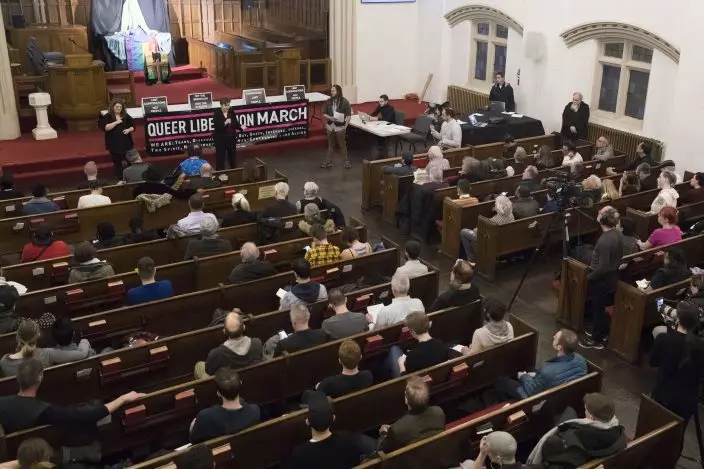
In this March 27, 2019, photo, activist Natalie James speaks during a meeting of the Reclaim Pride Coalition at the Church of the Village in New York. Activists who believe New York City’s annual LGBTQ Pride march has become too commercialized are staging an alternative march the same day. The two marches through Manhattan streets will take place Sunday, June 30, the last day of a month of celebrations marking the 50th anniversary of the 1969 Stonewall uprising. (AP PhotoMary Altaffer)
Organizers of the insurgent Queer Liberation March say they expect 10,000 or more at their event, which they say will have a protest vibe.
The main Pride march, the dissidents say, has strayed too far from its roots as a ragtag liberation demonstration celebrating an act of resistance. They complain that today's march is dominated by corporate floats and is too heavily policed by the same department that raided the Stonewall in 1969.
Police Commissioner James O'Neill apologized this month for the Stonewall raid, but organizers of the alternative march deemed the apology too little, too late.
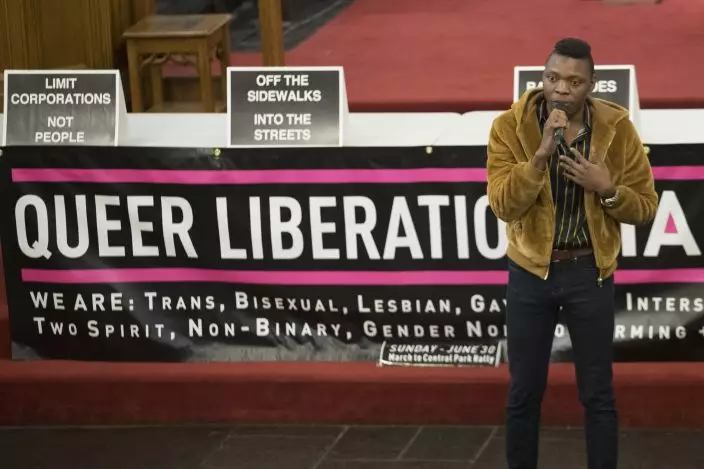
In this March 27, 2019, photo, Nigerian activist Michael Ighodaro speaks during a meeting of the Reclaim Pride Coalition at the Church of the Village in New York. Activists who believe New York City’s annual LGBTQ Pride march has become too commercialized are staging an alternative march the same day. The two marches through Manhattan streets will take place Sunday, June 30, the last day of a month of celebrations marking the 50th anniversary of the 1969 Stonewall uprising. (AP PhotoMary Altaffer)
The upstart queer march is scheduled to start at 9:30 a.m. at the Stonewall Inn and end with a rally in Central Park.
The larger NYC Pride March will step off at noon with corporate sponsors including T-Mobile, MasterCard and Delta Air Lines. It will also pass by the Stonewall Inn before concluding in the Chelsea neighborhood. A related closing ceremony in Times Square will feature a performance by Melissa Etheridge.
There are 677 contingents marching in the larger parade, each of which had to register months in advance. Police barricades will keep marchers separate from the throngs of cheering spectators, as they do at other large New York City gatherings like the St. Patrick's Day Parade.
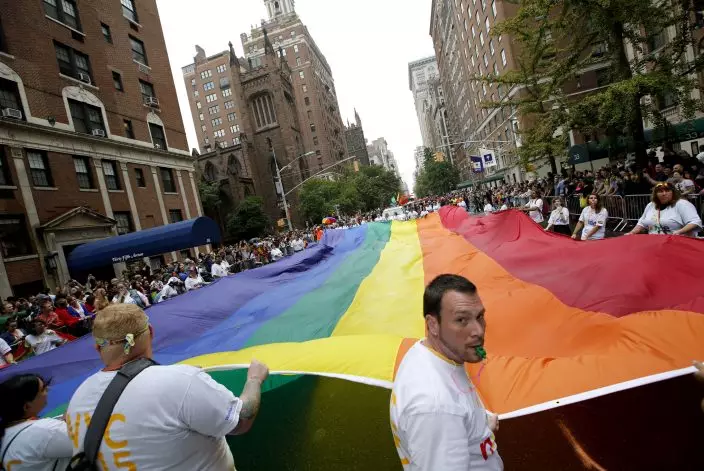
In this June 28, 2015 file photo, participants carry a rainbow-colored flag down Fifth Avenue in New York during the Heritage Pride March in New York. One of the biggest celebrations of LGBT pride in New York City history will culminate Sunday, June 30, 2019, with not one, but two processions through the streets of Manhattan, after dissidents who believe the annual parade has become too commercialized decided to split off with their own march. (AP PhotoKathy Willens, File)
Those barricades are one of the things that have upset participants in the Liberation March, who say anyone will be welcome to join their procession.
"In the original marches, the whole point was that anybody could join in," said one of the organizers, Ann Northrop. "You could walk off the sidewalks and into the street and everybody was welcome, and that no longer applies."
Reclaim Pride supporters also claim that the presence of so many corporate floats in premier spots forces grassroots contingents to the back of the line.
Charles King, the CEO of Housing Works, an AIDS advocacy organization that's handling the finances for the Reclaim Pride Coalition, said marchers from his group were placed so far back last year it was completely dark by the time they finished parading.
"The question is, what is this about?" King said. "Is this about our liberation? Or is this just one more commercial activity, like the Macy's (Thanksgiving) parade?"
And, backers of the Liberation March say, the NYC Pride March can simply be too festive, letting celebration drown out anger over continued bigotry toward LGTBQ people.
"I love Pride. I first marched in Pride in 1979. But I think that right now there is more than a celebration that needs to be had for the Pride parade," said Tom Viola, executive director of the theater world charity Broadway Cares Equity Fights AIDS, which has donated $25,000 to the Queer Liberation March. "We need to acknowledge not only our victories; we need to mourn our losses, and we need to take a strong stand against those who would diminish or demean us."
But the main march has grown much too large to be staged without security precautions or corporate support, said Cathy Renna, a spokeswoman for NYC Pride.
NYC Pride's annual budget for the march and some two dozen other Pride month events is about $12 million, including mandatory payments to the police department.
"The reality is that those sponsors and partners help the march happen and help make it free for tens of thousands of people," Renna said.
"I'm not nostalgic for the bad old days, to be totally honest," she said. "The reason we're having these discussions is because so many people have come out. Because there's been so much progress. Are we begrudging that?"
Supporters note that the main Pride parade still has a notable protest element. Past marches have seen colorfully costumed dancers sharing the route with groups protesting violence against transgender people or a lack of AIDS funding.
"This is a debate that has existed for as long as Pride has existed," said James Fallarino, a member of the executive board of Heritage of Pride, which stages the main march. "Our community has had to deal with a lot in the last 50 years, and we have always found a way to unleash our anger while at the same time celebrating who we are and our diversity and our unapologetic pride."
Activists also staged an alternative New York City march in 1994, accusing official parade organizers of downplaying the AIDS crisis, among other issues.
The staggered start times should allow people to participate in both marches, which is what Rabbi Sharon Kleinbaum plans to do.
"I believe there are many different ways to express the feelings that we have at this particular moment in history 50 years after Stonewall," said Kleinbaum, the pastor of Congregation Beit Simchat Torah, which serves the LGBT Jewish community, and a grand marshal of the Pride parade in 2007.
Kleinbaum said her congregation will have a presence at each march Sunday.
"I think there's room for both," she said, "and we need to not create circular firing squads."
Find complete AP Stonewall anniversary coverage here: https://apnews.com/Stonewallat50
VENICE, Italy (AP) — Under the gaze of the world’s media, the fragile lagoon city of Venice launches a pilot program Thursday to charge day-trippers a 5-euro (around $5.35) entry fee that authorities hope will discourage visitors from arriving on peak days and make the city more livable for its dwindling residents.
Signs advising arriving visitors of the new requirement for a test phase of 29 days through July have been erected outside the main train station and other points of arrival.
Some 200 stewards have been trained to politely walk anyone unaware of the fee through the process of downloading a QR code. A kiosk has been set up for those not equipped with a smartphone. Once past designated entry ports, officials will carry out random checks for QR codes that show the day-tripper tax has been paid or that the bearer is exempt.
Transgressors face fines 50 euros to 300 euros. The requirement applies only for people arriving between 8:30 a.m. and 4 p.m. Outside of those hours, access is free.
“We need to find a new balance between the tourists and residents,’’ said the city’s top tourism official, Simone Venturini. “We need to safeguard the spaces of the residents, of course, and we need to discourage the arrival of day-trippers on some particular days.”
Venice has long suffered under the pressure of over-tourism, but officials say that pre-pandemic estimates ranging from 25 million to 30 million visitors a year — including day-trippers — are not reliable and that the pilot project also aims to come up with more exact figures to help better manage the phenomenon.
By contrast, registered visitors spending the night last year numbered 4.6 million, according to city figures, down 16% from pre-pandemic highs.
Venturini said the city is strained when the number of day-trippers reaches 30,000 to 40,000. Its narrow alleyways are clogged with people and water taxis packed, making it difficult for residents to go about their business.
Not all residents, however, are persuaded of the efficacy of the new system in dissuading mass tourism, and say more attention needs to be paid to boosting the resident population and services they need.
Venice last year passed a telling milestone when the number of tourist beds exceeded for the first time the number of official residents, which is now below 50,000 in the historic center with its picturesque canals.
“Putting a ticket to enter a city will not decrease not even by one single unit the number of visitors that are coming,’’ said Tommaso Cacciari, an activist who organized a protest Thursday against the measure.
“You pay a ticket to take the metro, to go to a museum, an amusement park; you don’t pay a ticket to enter a city. This is the last symbolic step of a project of an idea of this municipal administration to kick residents out of Venice,” he said.
Venturini said about 6,000 people had already paid to download the QR code, and officials expect paid day-tripper arrivals Thursday to reach some 10,000.
More than 70,000 others have downloaded a QR code denoting an exemption, including to work in Venice or as a resident of the Veneto region. People staying in hotels in Venice, including in mainland districts like Marghera or Mestre, should also get a QR code attesting to their stay, which includes a hotel tax.
The tourist official says interest in Venice's pilot program has been keen from other places suffering from mass tourism, including other Italian art cities and cities abroad such as Barcelona and Amsterdam.
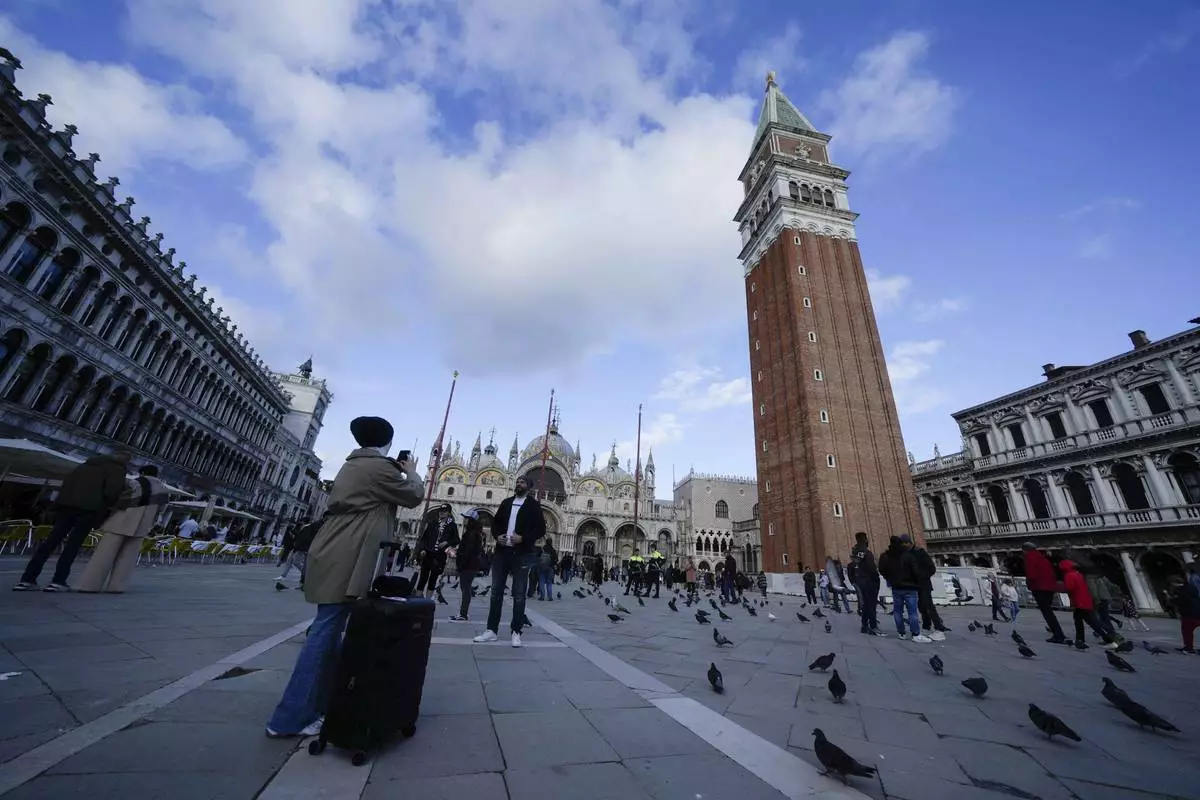
Tourists take pictures at the St. Mark square in Venice, Italy, Wednesday, April 24, 2024. The lagoon city of Venice begins a pilot program Thursday, April 25, 2024 to charge daytrippers a 5 euro entry fee that authorities hope will discourage tourists from arriving on peak days. Officials expect some 10,000 people will pay the fee to access the city on the first day, downloading a QR code to prove their payment. (AP Photo/Luca Bruno)
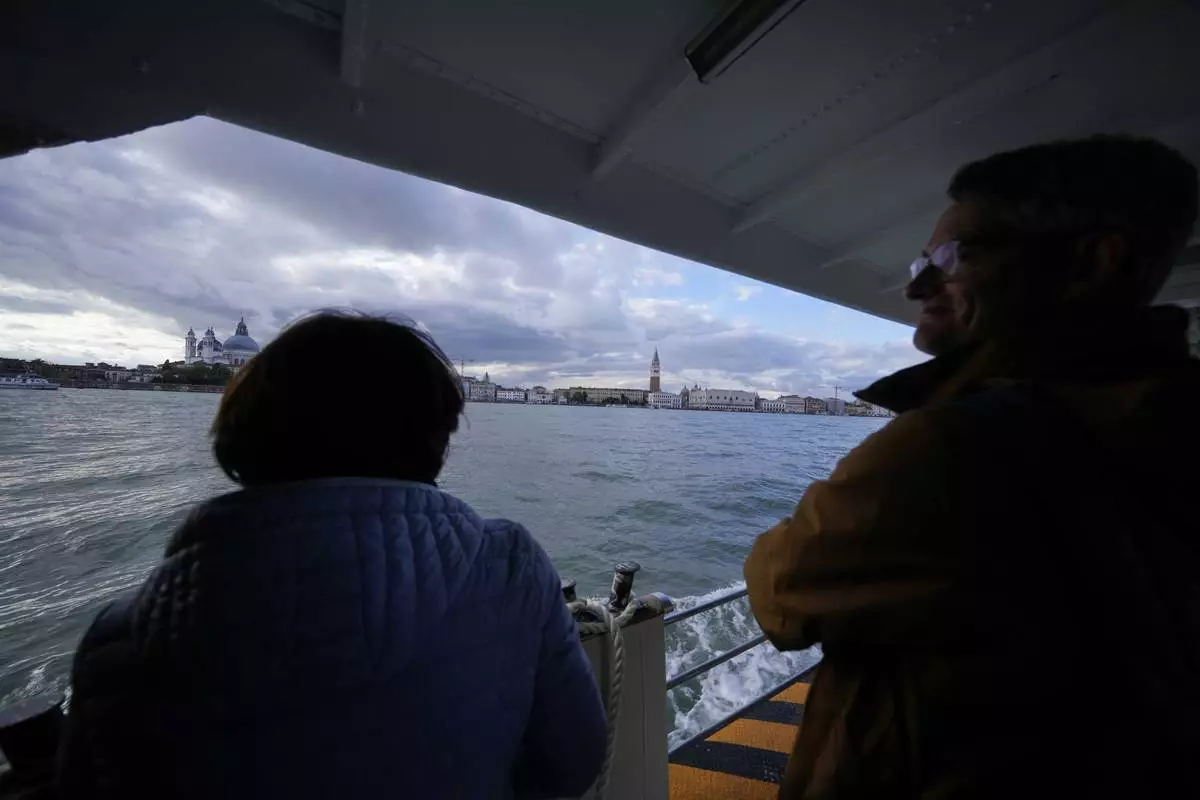
Tourists ride on a ferry boat in Venice, Italy, Wednesday, April 24, 2024. The lagoon city of Venice begins a pilot program Thursday, April 25, 2024 to charge daytrippers a 5 euro entry fee that authorities hope will discourage tourists from arriving on peak days. Officials expect some 10,000 people will pay the fee to access the city on the first day, downloading a QR code to prove their payment. (AP Photo/Luca Bruno)
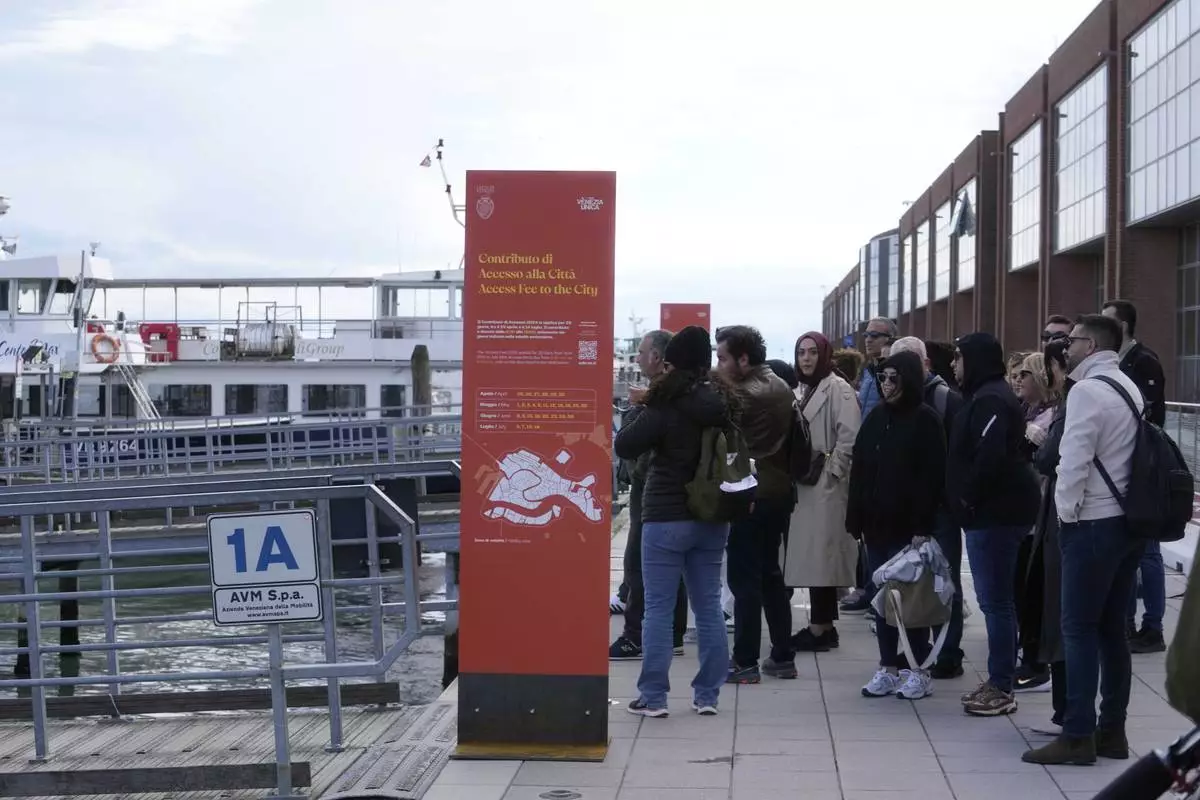
People stand in front of an information board explaining how to pay the tourist tax in Venice, Italy, Wednesday, April 24, 2024. The lagoon city of Venice begins a pilot program Thursday, April 25, 2024 to charge daytrippers a 5 euro entry fee that authorities hope will discourage tourists from arriving on peak days. Officials expect some 10,000 people will pay the fee to access the city on the first day, downloading a QR code to prove their payment. (AP Photo/Luca Bruno)
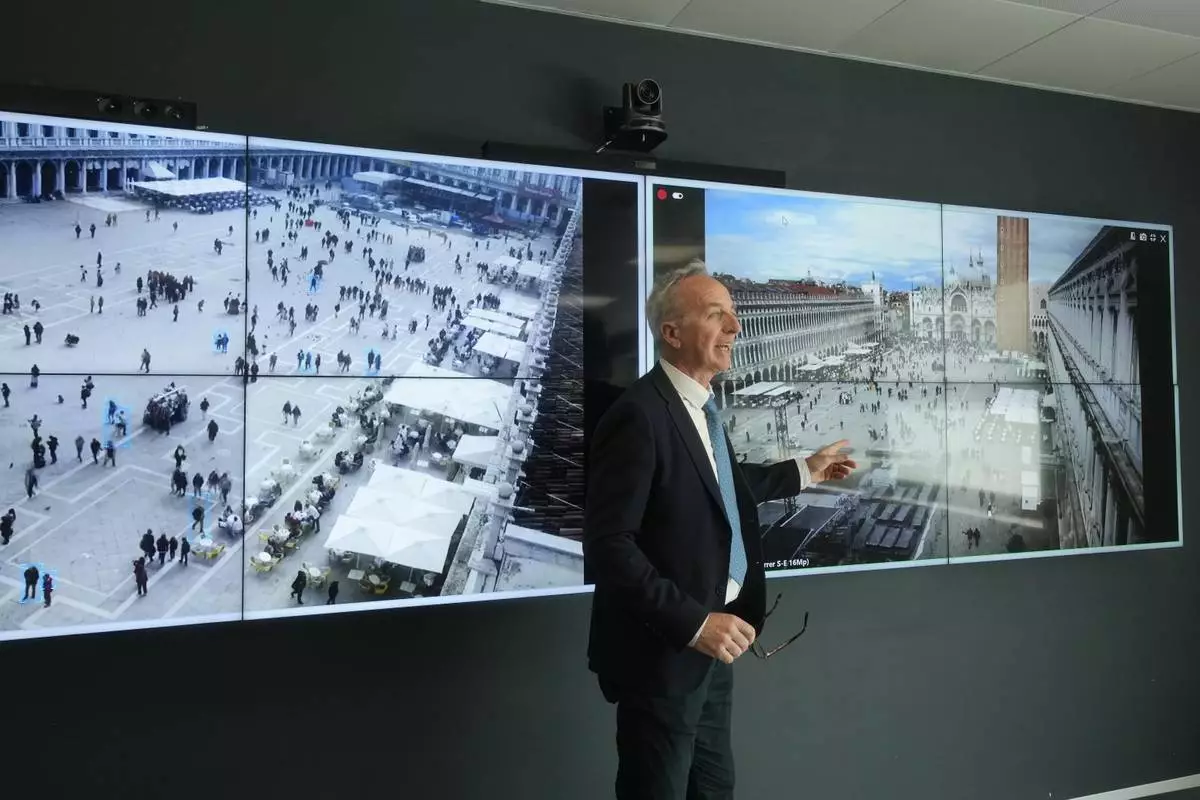
Marco Bettini, director of Venis Informatics System, gestures as he talks to reporters at the police Venice control room, in Venice, Italy, Wednesday, April 24, 2024. The lagoon city of Venice begins a pilot program Thursday, April 25, 2024 to charge daytrippers a 5 euro entry fee that authorities hope will discourage tourists from arriving on peak days. Officials expect some 10,000 people will pay the fee to access the city on the first day, downloading a QR code to prove their payment. (AP Photo/Luca Bruno)
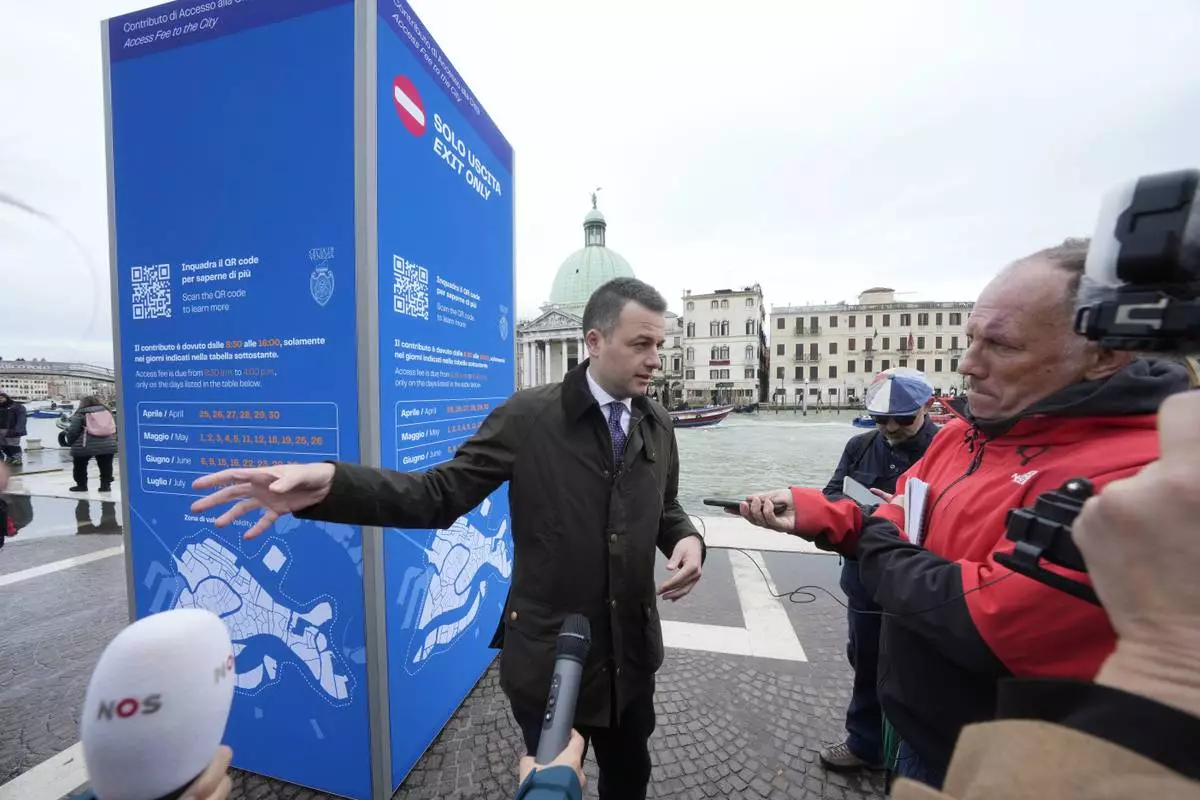
Venice councillor Simone Venturini speaks with reporters in front of a tourist tax totem in Venice, Italy, Wednesday, April 24, 2024. The lagoon city of Venice begins a pilot program Thursday, April 25, 2024 to charge daytrippers a 5 euro entry fee that authorities hope will discourage tourists from arriving on peak days. Officials expect some 10,000 people will pay the fee to access the city on the first day, downloading a QR code to prove their payment. (AP Photo/Luca Bruno)
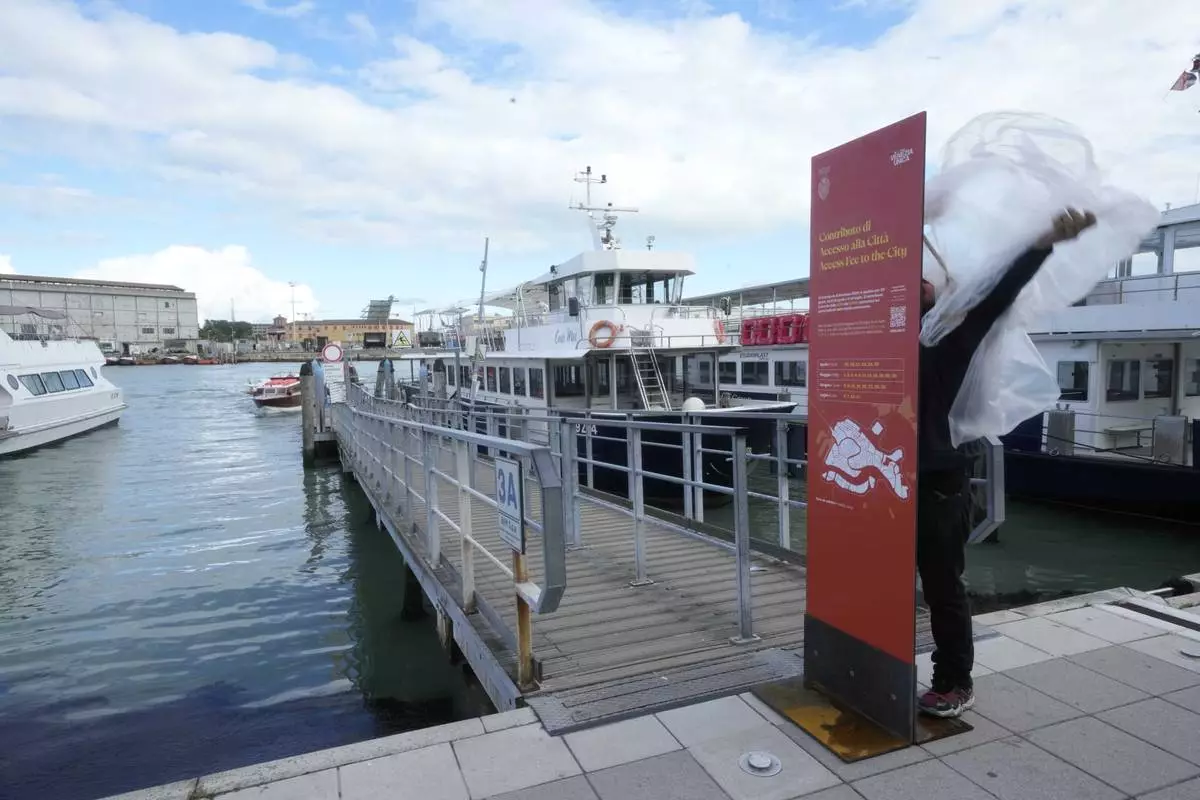
Workers prepare banner explaining how to pay the tourist tax in Venice, Italy, Wednesday, April 24, 2024. The lagoon city of Venice begins a pilot program Thursday, April 25, 2024 to charge daytrippers a 5 euro entry fee that authorities hope will discourage tourists from arriving on peak days. Officials expect some 10,000 people will pay the fee to access the city on the first day, downloading a QR code to prove their payment. (AP Photo/Luca Bruno)
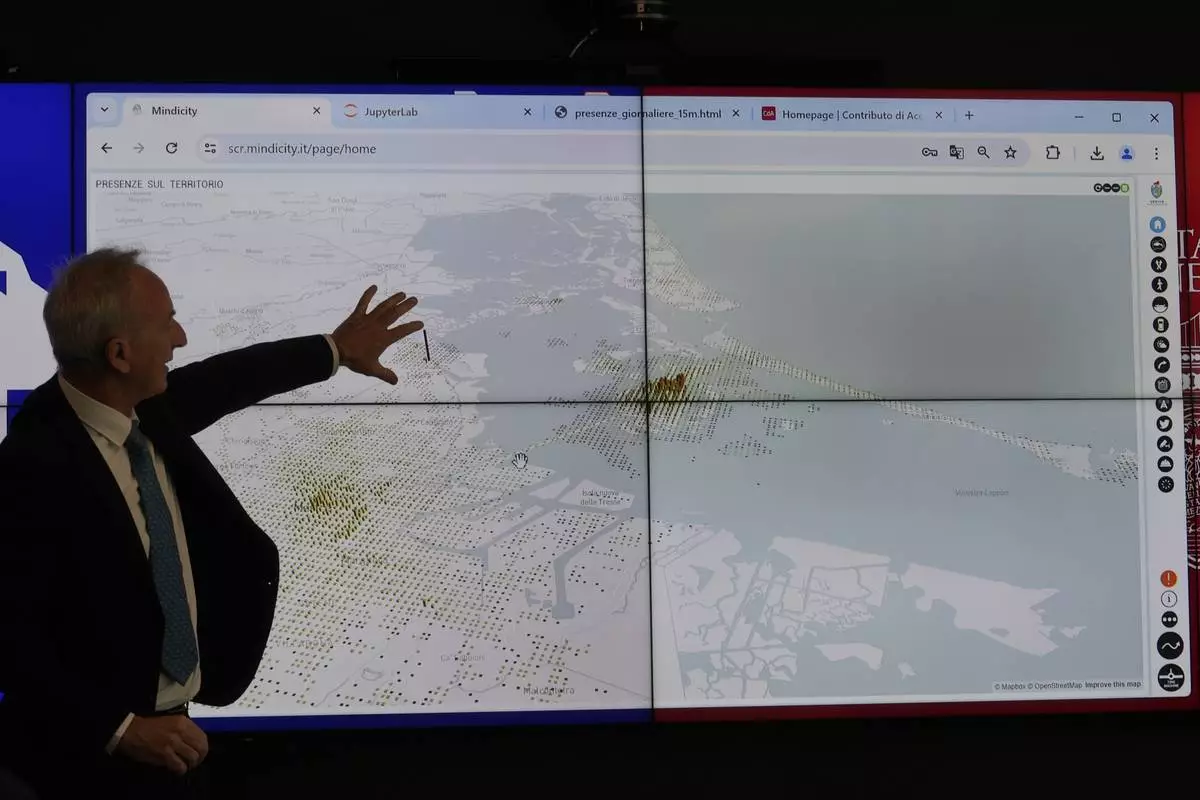
Marco Bettini, director of Venis Informatics System, gestures as he explains the Venice density to reporters at the police Venice control room in Venice, Italy, Wednesday, April 24, 2024. The lagoon city of Venice begins a pilot program Thursday, April 25, 2024 to charge daytrippers a 5 euro entry fee that authorities hope will discourage tourists from arriving on peak days. Officials expect some 10,000 people will pay the fee to access the city on the first day, downloading a QR code to prove their payment. (AP Photo/Luca Bruno)
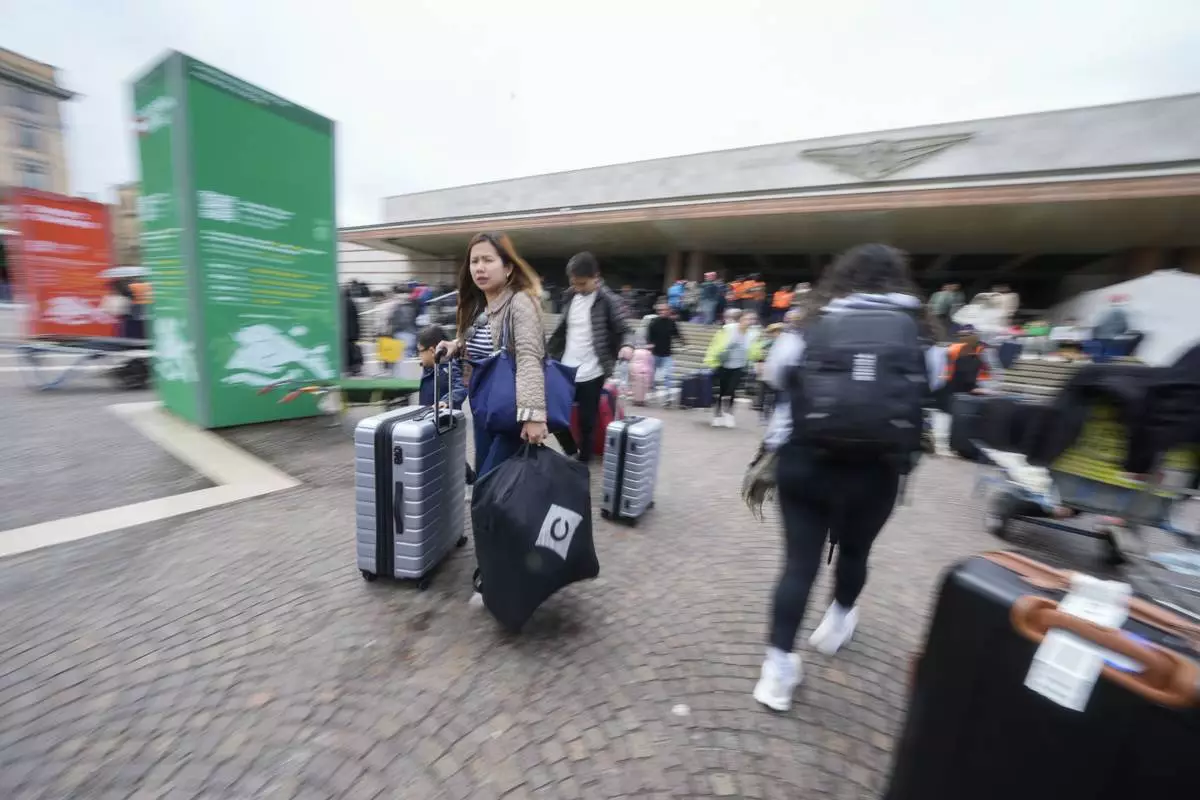
Tourists arrive at the main train station in Venice, Italy, Wednesday, April 24, 2024. The lagoon city of Venice begins a pilot program Thursday, April 25, 2024 to charge daytrippers a 5 euro entry fee that authorities hope will discourage tourists from arriving on peak days. Officials expect some 10,000 people will pay the fee to access the city on the first day, downloading a QR code to prove their payment. (AP Photo/Luca Bruno)
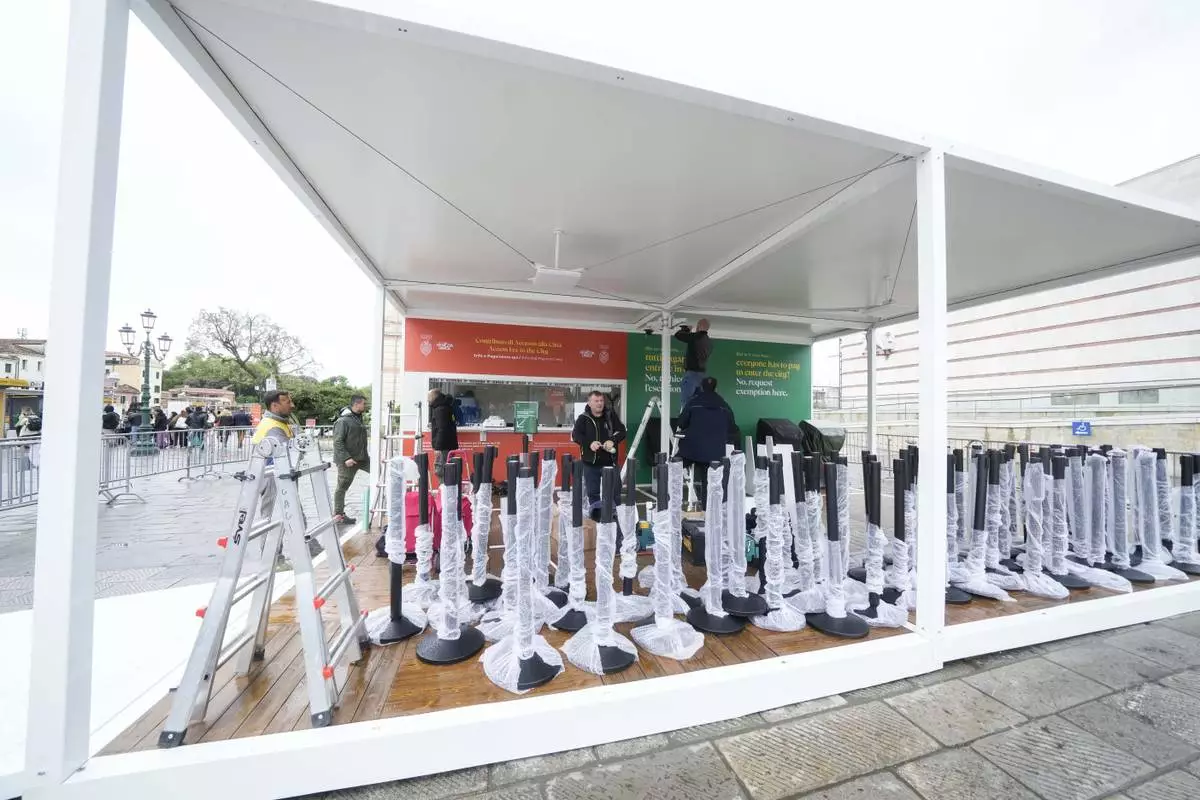
Workers prepare the tourist tax cashier desks outside the main train station in Venice, Italy, Wednesday, April 24, 2024. The lagoon city of Venice begins a pilot program Thursday, April 25, 2024 to charge daytrippers a 5 euro entry fee that authorities hope will discourage tourists from arriving on peak days. Officials expect some 10,000 people will pay the fee to access the city on the first day, downloading a QR code to prove their payment. (AP Photo/Luca Bruno)
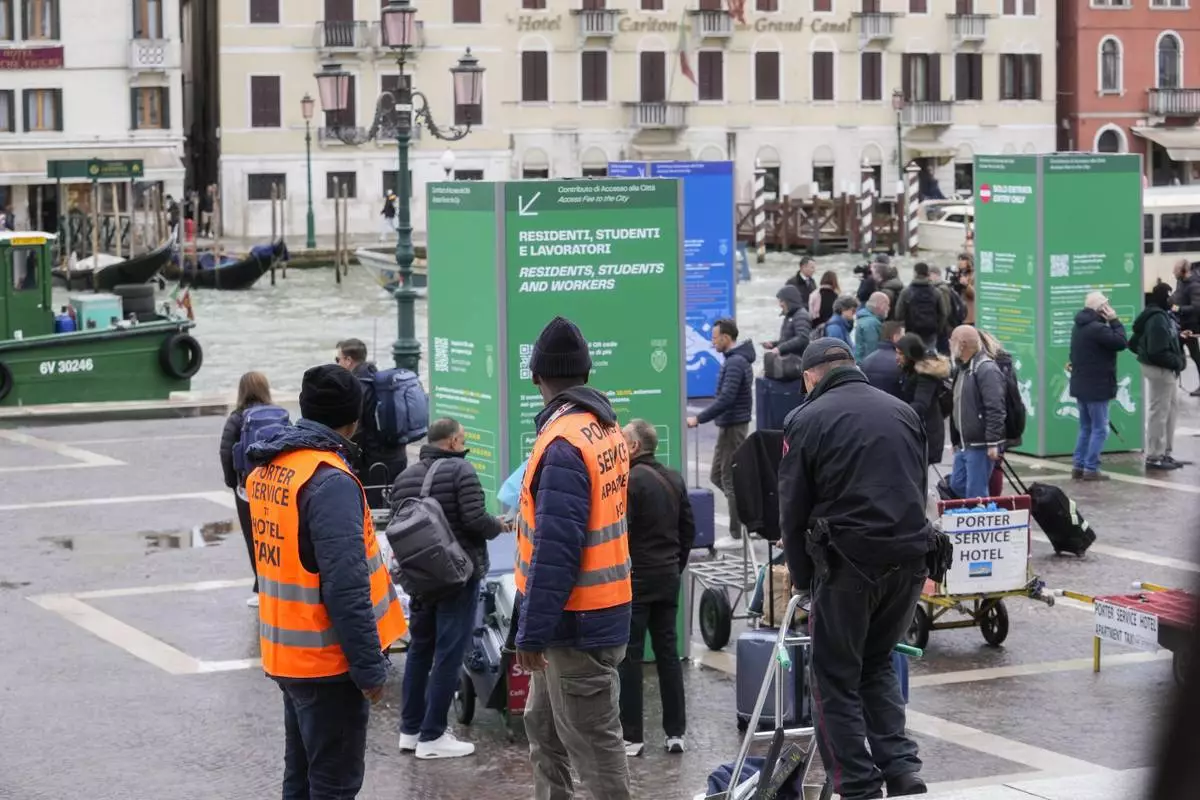
Porters wait for tourists outside the main train station in Venice, Italy, Wednesday, April 24, 2024. The lagoon city of Venice begins a pilot program Thursday, April 25, 2024 to charge daytrippers a 5 euro entry fee that authorities hope will discourage tourists from arriving on peak days. Officials expect some 10,000 people will pay the fee to access the city on the first day, downloading a QR code to prove their payment. (AP Photo/Luca Bruno)
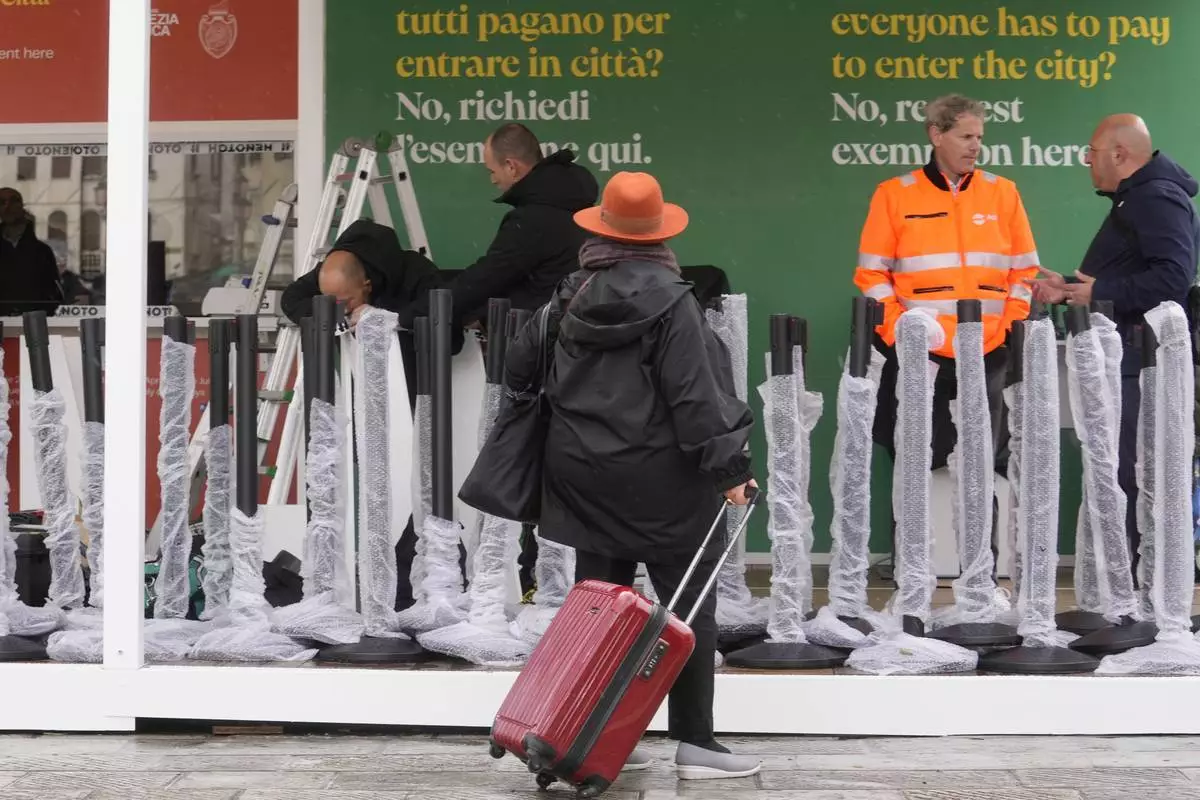
Workers prepare the tourist tax cashier desks outside the main train station in Venice, Italy, Wednesday, April 24, 2024. The lagoon city of Venice begins a pilot program Thursday, April 25, 2024 to charge daytrippers a 5 euro entry fee that authorities hope will discourage tourists from arriving on peak days. Officials expect some 10,000 people will pay the fee to access the city on the first day, downloading a QR code to prove their payment. (AP Photo/Luca Bruno)
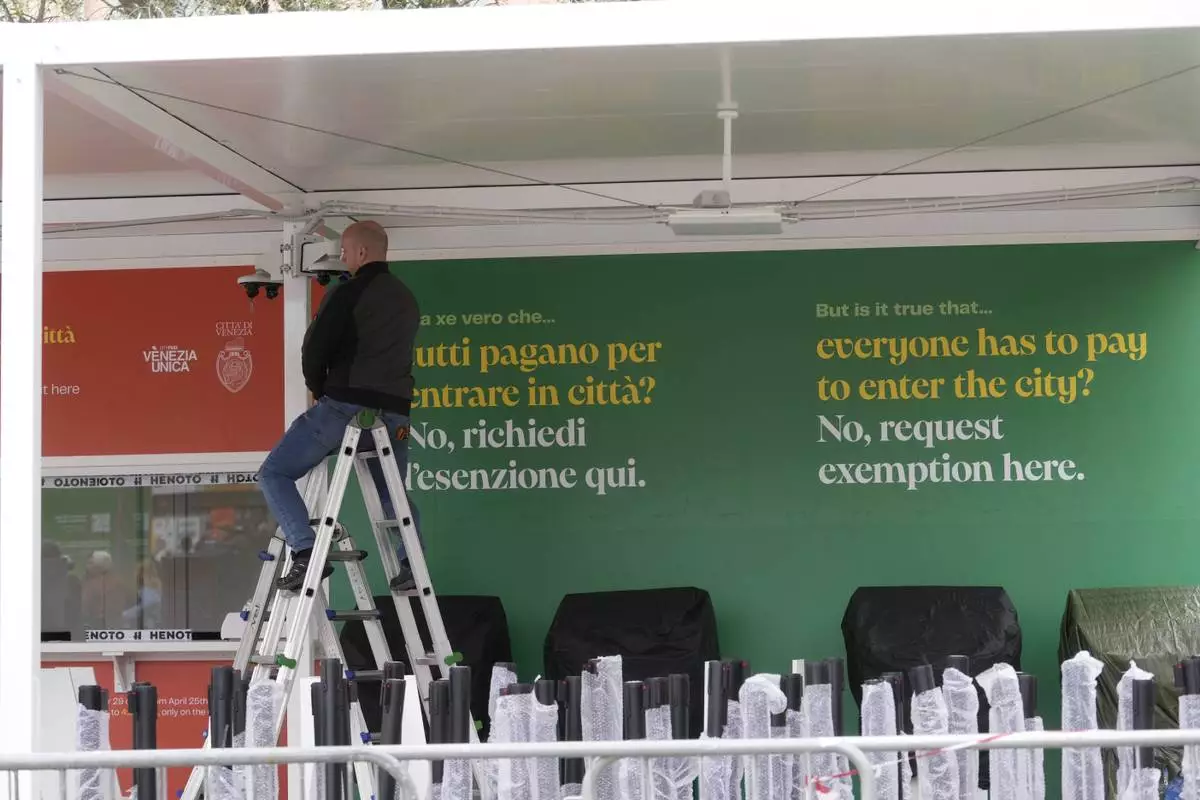
Workers prepare the tourist tax cashier desks outside the main train station in Venice, Italy, Wednesday, April 24, 2024. The lagoon city of Venice begins a pilot program Thursday, April 25, 2024 to charge daytrippers a 5 euro entry fee that authorities hope will discourage tourists from arriving on peak days. Officials expect some 10,000 people will pay the fee to access the city on the first day, downloading a QR code to prove their payment. (AP Photo/Luca Bruno)
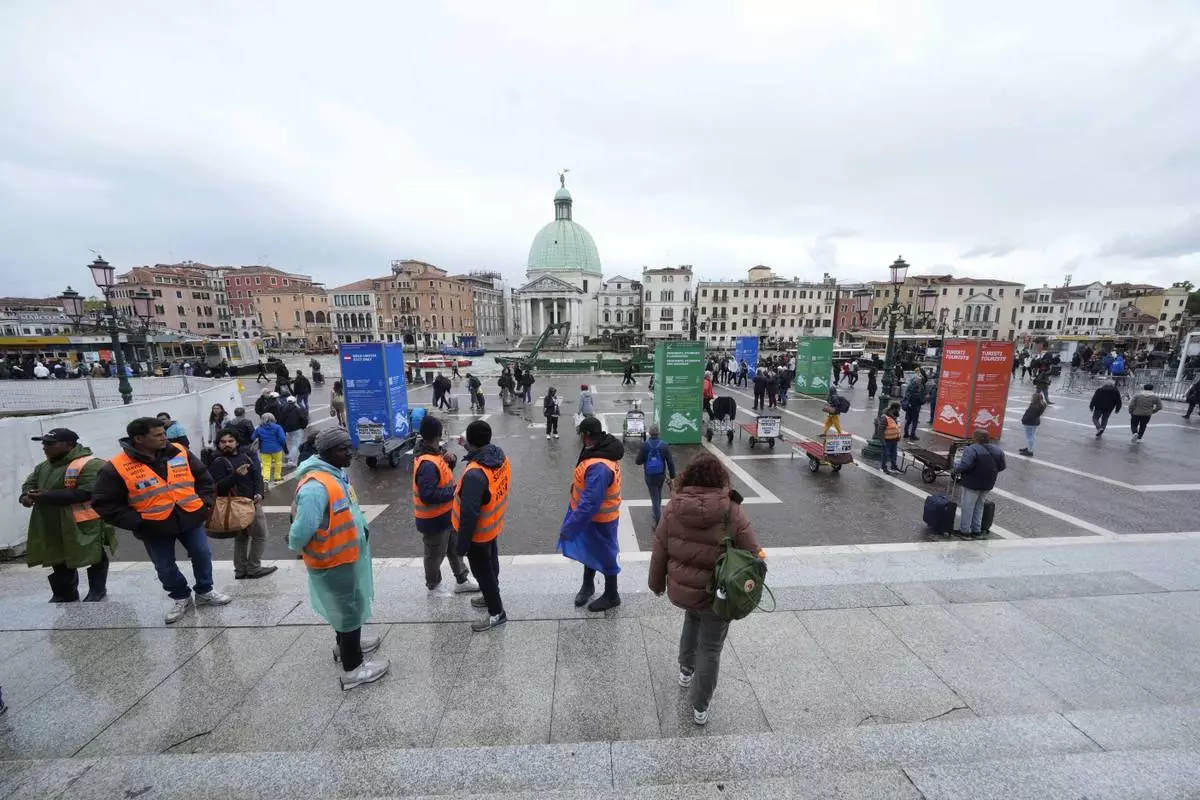
Porters wait for tourists outside the main train station in Venice, Italy, Wednesday, April 24, 2024. The lagoon city of Venice begins a pilot program Thursday, April 25, 2024 to charge daytrippers a 5 euro entry fee that authorities hope will discourage tourists from arriving on peak days. Officials expect some 10,000 people will pay the fee to access the city on the first day, downloading a QR code to prove their payment. (AP Photo/Luca Bruno)
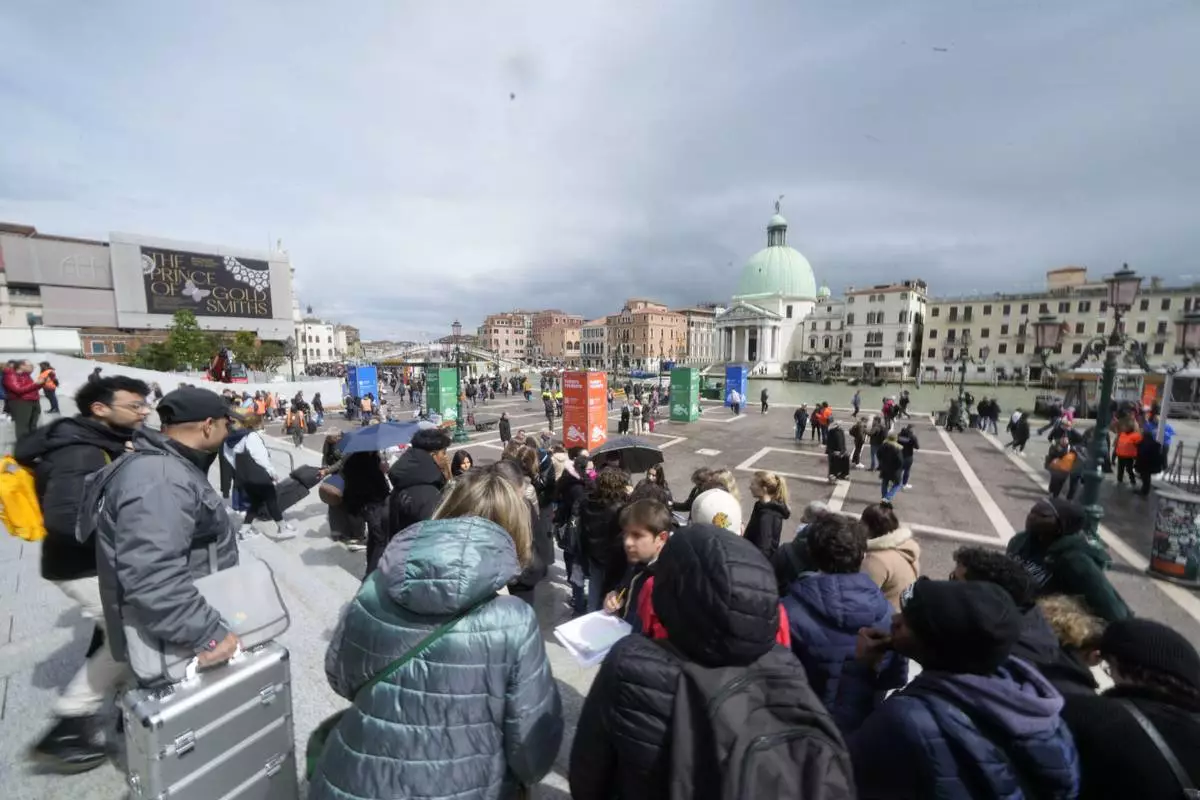
Tourists arrive outside the main train station in Venice, Italy, Wednesday, April 24, 2024. The lagoon city of Venice begins a pilot program Thursday, April 25, 2024 to charge daytrippers a 5 euro entry fee that authorities hope will discourage tourists from arriving on peak days. Officials expect some 10,000 people will pay the fee to access the city on the first day, downloading a QR code to prove their payment. (AP Photo/Luca Bruno)
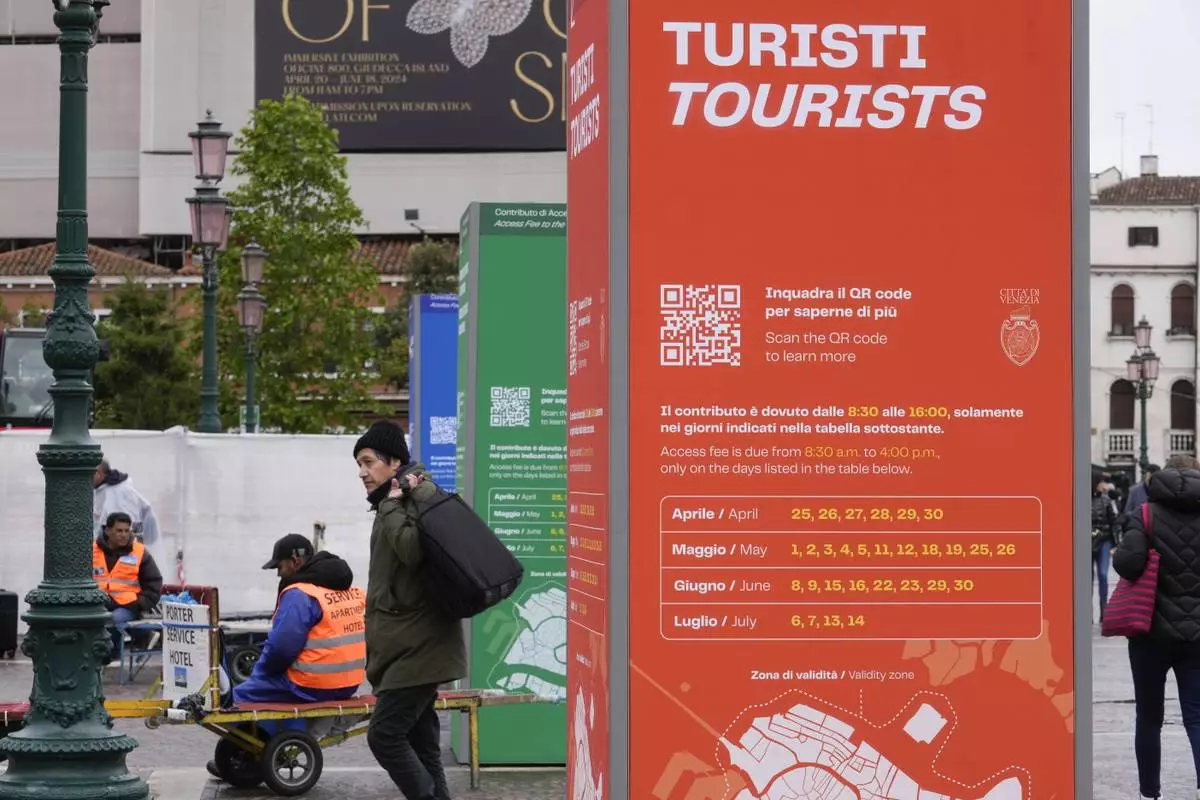
Tourist information boards are seen outside the main train station in Venice, Italy, Wednesday, April 24, 2024. The lagoon city of Venice begins a pilot program Thursday, April 25, 2024 to charge daytrippers a 5 euro entry fee that authorities hope will discourage tourists from arriving on peak days. Officials expect some 10,000 people will pay the fee to access the city on the first day, downloading a QR code to prove their payment. (AP Photo/Luca Bruno)
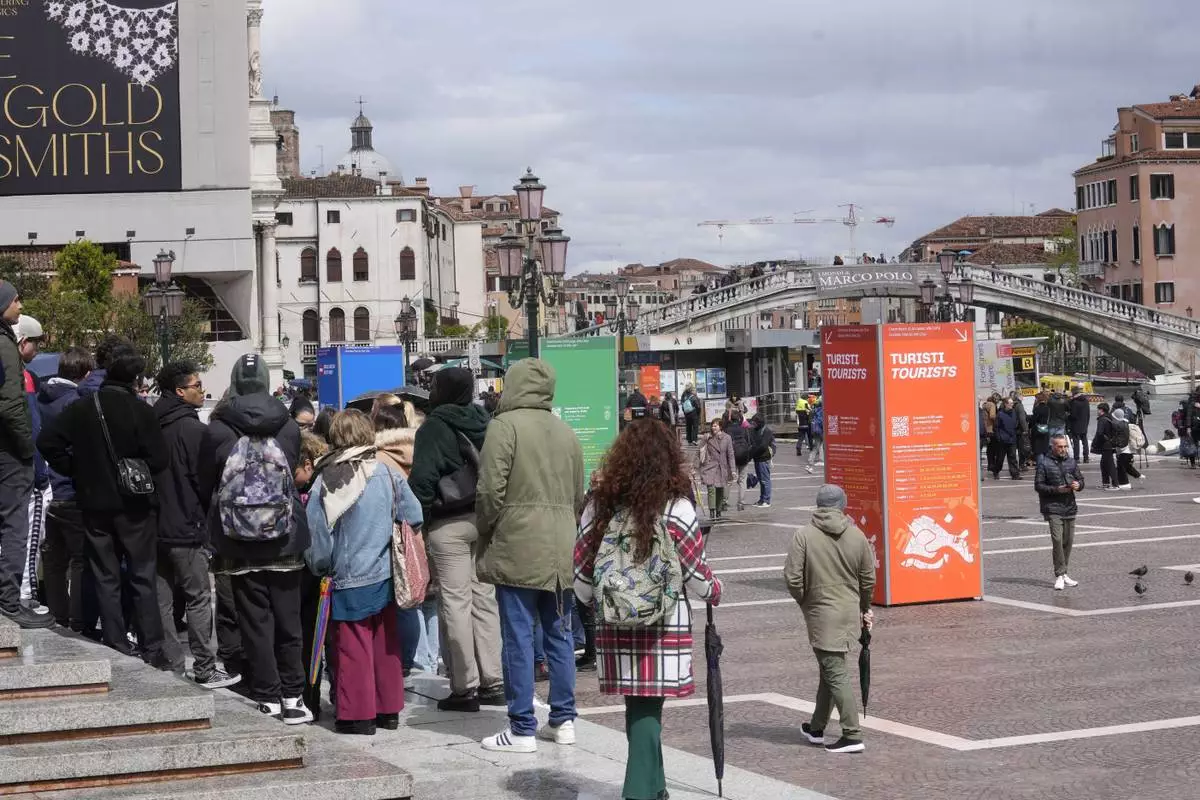
Tourists arrive outside the main train station in Venice, Italy, Wednesday, April 24, 2024. The lagoon city of Venice begins a pilot program Thursday, April 25, 2024 to charge daytrippers a 5 euro entry fee that authorities hope will discourage tourists from arriving on peak days. Officials expect some 10,000 people will pay the fee to access the city on the first day, downloading a QR code to prove their payment. (AP Photo/Luca Bruno)




























